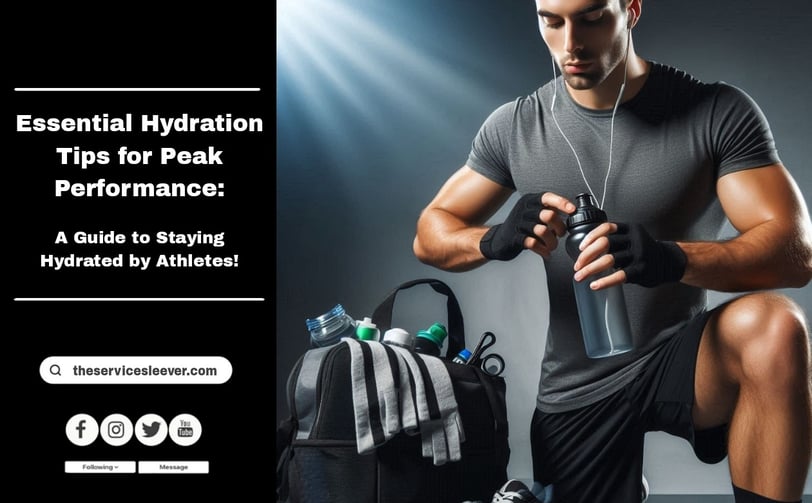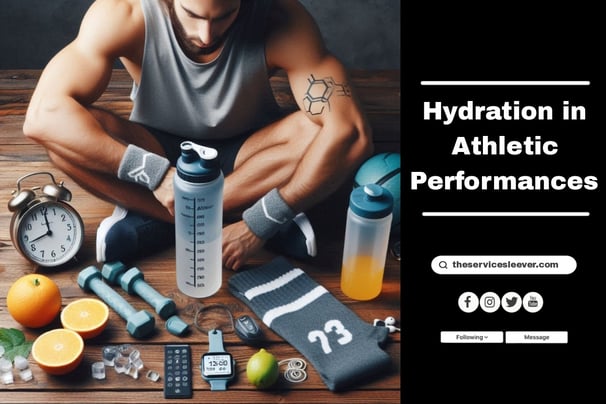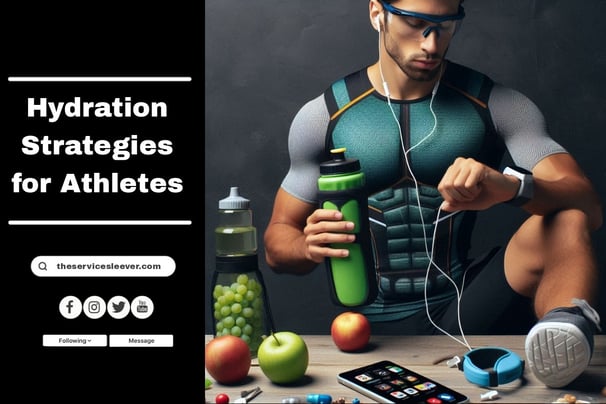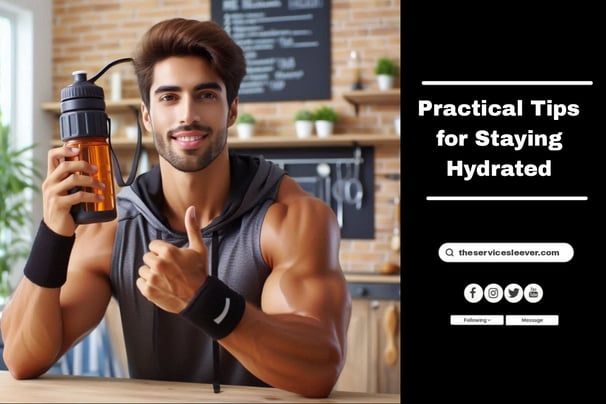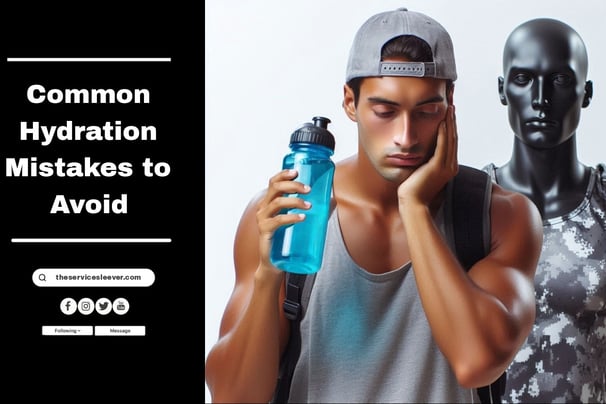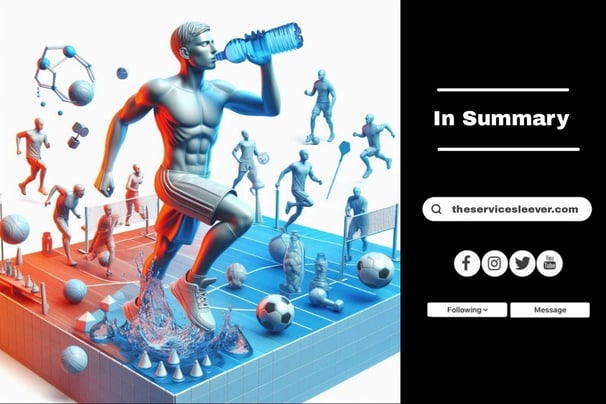A Guide to Staying Hydrated by Athletes! | Essential Hydration Tips for Peak Performance
Discover essential hydration tips for athletes and improve performance. Learn about staying hydrated by athletes, hydration strategies, and common mistakes to avoid.
HYDRATION
Introduction
Maintaining your hydration levels is just as crucial to your athletic performance as your exercise program. Have you heard that your physical abilities can be severely compromised by even a 2% drop in body water? Staying hydrated when exercising is crucial to keeping your body functioning properly, from controlling body temperature to lubricating joints while properly delivering vital nutrients.
Having a better understanding of the impact of staying hydrated by athletes or any other fitness enthusiasts can be a game changer on their performances as well as their overall lifestyle. Dehydration can lead to reduced strength and endurance, as well as overall effectiveness. It can cause or increase the risk of heat-related illnesses and injuries that can happen from their high, intense workloads. Therefore, recognizing these symptoms of dehydration, such as fatigue, dizziness, and muscle cramps, can help you to avoid these problems and reduce the injuries that can happen.
We are going to explore the essential role of hydration for athletic performances and provide practical tips for staying properly hydrated before, during, and after your workouts. Implementing these strategies will ensure that you are performing at your best while safeguarding your overall health.
Hydration in Athletic Performances:
Water is the most vital nutrient of the body that plays a crucial role in various physiological processes, which directly affect your athletic performance. Your body highly relies on water while you are exercising to maintain core temperature by supporting joint function and facilitating the transport of nutrients and oxygen to your muscles. Therefore, maintaining optimal body function by staying hydrated by athletes helps to achieve their peak performances.
Impact on body functionality:
Water helps to regulate body temperature that generated during exercising. The body can sweat efficiently by allowing heat to dissipate and preventing overheating through maintaining adequate hydration. Water acts as a lubricant for joints that helps to reduce the risk of injuries and enhancing flexibility and mobility of the body. And most importantly water plays a key role in transporting nutrients and oxygen to the muscles. It facilitate sustaining energy levels and promotes muscle recovery.
Impact on Performances:
Dehydration can have a significant negative impact on the performance of athletes. When the body is dehydrated, blood volume decreases. That can be making it harder for the heart to pump blood and deliver oxygen to the muscles. This can lead to early fatigue, reduced strength, and decreased endurance in athletes. Dehydration can also cause dizziness, confusion, and even heat-related illnesses such as heat exhaustion or heat strokes. Therefore, staying hydrated by athletes is essential to avoid these adverse effects and maintain their performance at optimum levels.
Symptoms of Hydration:
Early signs recognition of dehydration can help athletes take proactive measures to stay hydrated. There are some common symptoms that can be mentioned. Such as thirst, dry mouth, dark yellow urine, fatigue, dizziness, and muscle cramps. And also, dehydration can cause rapid heartbeat, confusion, and fainting in advanced stages. So the athletes can adjust their hydration strategies accordingly and ensure they are adequately hydrated throughout their workouts and competitions by monitoring these symptoms.
Hydration Strategies for Athletes:
So now we have some idea about the importance of staying hydrated by athletes and how it causes for their individual performances as well as their health. Here are some effective hydration strategies to help athletes stay properly hydrated before, during, and after their workouts.
Pre-Workout Hydration:
Before Exercising: Athletes should aim to drink about 500ml - 600ml of water in 2-3 hours before exercising. This ensures that the body of the athlete is well-hydrated and has time to absorb the water.
Timing for Hydration: Athletes should consume an additional 200ml – 300ml of water before 20-30 minutes before starting their workout sessions. This will prepare the body of the athlete for physical activities by helping to top off fluid levels in the body.
During Workout Hydration:
Frequency of Intake: Staying hydrated by athletes during workouts is also mentioned as a crucial factor. Especially for longer or more intense sessions. Athletes should aim to drink 200ml - 300 ml of water every 10-20 minutes during these highly intense exercise sessions.
Amount: The amount of fluid needed can vary based on the intensity and duration of the workout. And also, it depends on the environmental conditions as well. Athletes may need to increase their fluid intake to compensate for increased sweat loss if they are doing their sessions under very hot or humid conditions.
Post-Workout Hydration:
Athletes should focus on rehydrating to replace lost fluids after their workout sessions. Drinking about 1.5 times the amount of fluid lost during exercise is a general guideline that is given to athletes. For example, if an athlete loses 1 liter of sweat, they should drink 1.5 liters of water.
Athletes can weigh themselves before and after exercise to calculate fluid loss. Each kilogram of weight lost corresponds to about 1 liter of fluid. So the rehydrating gradually according to that loss over the next few hours is ideal for effective recovery.
Choosing the Right Hydration Methods:
Water vs Sports Drinks
Athletes can typically stay hydrated with plain water during workouts that last less than an hour. It is easily accessible and works well to keep you from becoming dehydrated. Sports drinks can be helpful for longer or more intense workouts. Because they contain carbohydrates and electrolytes. Carbohydrates serve as an energy source while electrolytes like sodium and potassium aid in maintaining fluid balance of the athlete.
Athletes can minimize their dehydration requirements by using new trends in hydration technology, such as hands-free hydration packs or smart water bottles that monitor fluid intake. Reusable water bottles are a sustainable solution that promote consistent hydration. Athletes' unique requirements can also be accommodated by customizing these containers, such as adding insulation to keep the water cool.
Practical Tips for Staying Hydrated
Staying hydrated by athletes requires consistent effort and mindful habits. Here are some practical tips that can be followed by any athlete to maintain their hydration levels at optimal levels throughout their day and training routines.
Habits for Staying Hydrated:
Daily Routine: Integrating time to hydration intake into your daily routine is essential for all athletes. Start your day with a glass of water. And make sure to continue the drink at regular intervals, whether you are practicing or not. Always make sure to carry a water bottle with you. It will definitely be a reminder to drink some water consistently throughout the day.
Monitor Your Hydration: Pay attention to your body’s signals that indicate your status of the hydration. Anyone can simply check it by observing the color of their urine. Pale yellow urine usually indicates proper hydration, while darker shades suggest the need for more fluids.
Diet and Hydration:
Incorporating foods with high water content can be mentioned as another strategically way to level up your hydration in your body. Fruits like watermelon, oranges, and strawberries, and vegetables such as cucumbers, lettuce, and celery, can be suggested as vegetables and fruits that can significantly contribute to your daily water intake. Sometimes people do not like to take direct liquid intakes because of sudden sweating and the heat up of the body. In such instances, you can incorporate these strategies to level up your hydration count of the body.
A balanced diet is rich in nutrients that can support overall hydration. From such meals, electrolytes found in foods like bananas, spinach, and avocados can help to maintain fluid balance and prevent dehydration of the body.
Hydration Tools and Techniques:
Incorporating digital technology and techniques into your hydration routine can be a reminder of your water intake. There are so many types of alarms and apps that are specifically created for these types of requirements. And also fitness trackers can be used as hydration reminders for yourself. Those methods can be included in your lifestyle to take sufficient liquid intake into your body to process well your mind as well as the body.
You can try adding some natural flavors into your water or any hydration liquid if you don’t like the plain water. Infusing your water with slices of lemon, lime, cucumber, or berries can make it more enjoyable while encouraging your regular water intake.
Adjusting Hydration under Different Conditions:
Athletes are training under different environmental conditions. Therefore, adopting the hydration strategy based on those changing environmental conditions is important. Athletes have to increase their fluid intake to compensate for higher sweat rates when practicing under hot or humid conditions. And also, staying hydrated in cold weather is also important. Because it counteracts the drying effects of heated indoor environments.
And also, athletes have to adjust their hydration intake based on their activity level. They should increase the fluid consumption during the intense or long-term workouts to replace their loss of water through sweat.
Hydration Accessories:
Investing in a high-quality reusable water bottle that suits your needs helps to remind your water intake as well as uplift the hydration process. You should definitely have these accessories as an athlete. It also helps to track your water intake per day and keep your water at a better temperature by built-in infusers, insulation, or measurement markers.
These kinds of hydration packs provide a convenient way to carry and sip water without interrupting the activity for the athletes who are engaging in long-duration activities like hiking or cycling.
Common Hydration Mistakes to Avoid:
Staying hydrated by athletes is crucial for their optimal performance as discuss throughout this article so far. But there are some common mistakes that can undermine their efforts. Here we are going to study some pitfalls to watch out for and tips on how to avoid them.
Over-Hydration:
Drinking too much water in a short period can lead to over-hydration or a hypernatremia condition where the sodium levels in the blood become dangerously low. Nausea, headache, confusion, and, in severe cases, seizures or coma can be mentioned as some symptoms that the athlete is going to suffer from. Drink according to the thirst, and monitoring the fluid intake is important to avoid this over hydration. Balanced water consumption with electrolyte intake can be mentioned as a good way to maintain the hydration level during prolonged or intense workouts.
Ignoring Thirst:
Thirst is the main dehydration sign of the body. Thirst is a natural indicator that your body needs fluids. Continuous ignoration of thirst can lead to dehydration of the body. It can cause for level down your performance level too. This thirst level can change due to the weather conditions and the practice environment. Therefore, it is important to always listen to your body indications and stay well hydrated during any of your work as an athlete. It will ensure your body health is better while enhancing your overall performances of the body.
Skipping Electrolytes:
Sometimes water is not sufficient to keep your hydration level at a good level as an athlete. Because you are engaging in high-intensity and long-duration practice sessions. In those high-intensity sessions, electrolytes like sodium, potassium, and magnesium of your body are lost through sweat and need to be replenished. Therefore, incorporating sports drinks, electrolyte tablets, or foods rich in electrolytes into your hydration strategy is important. This will help to maintain fluid balance while preventing injuries that can happen, like cramping and fatigue.
Inconsistent Hydration:
Irregular hydration patterns can lead to periods of dehydration. It can be negatively affecting athletes' performances. Therefore, establishing a routine to ensure consistent fluid intake throughout the day is important. Every athlete can plan ahead for hydration, particularly before and after workouts. Ensure you have access to water or sports drinks during training sessions and competitions. This should be highly focused by the coaches or supporting staff as well. They should allocate some time to hydrate their students during these practice sessions.
Neglecting Hydration in Cold Weather:
Most people do not think about their hydration levels when working in cold environments. The body can lose significant fluids through respiration and perspiration in cold weather conditions even if you don't feel as thirsty. Therefore, being mindful of your hydration needs in all weather conditions and maintaining regular fluid intake regardless of temperature is important.
Using Sugary Beverages:
Sugar-rich beverages, like sodas and some energy drinks, can exacerbate dehydration instead of helping it. They may also result in various health problems and energy crashes. Therefore choose water, infused water, or low-sugar sports drinks to stay hydrated without the negative effects of sugary beverages.
Athletes can support their performance and general health by proactively avoiding common hydration mistakes and making sure they are effectively staying hydrated.
In Summary
Athletes must stay hydrated in order to perform at their optimal level while maintaining their general health in a good level. Hydration is essential for maintaining body temperature, lubricating joints, and transporting nutrients, which are required for optimal sports performances. Strength, endurance, and cognitive function can all be negatively impacted by dehydration. So athletes must prioritize their hydration techniques.
Athletes can keep themselves hydrated before, during, and after their workouts by understanding the importance of hydration and implementing effective strategies. Maintaining fluid intake during exercise helps prevent dehydration and helps maintain energy levels. Hydrating before, during, and after a workout sets the stage for success. Recovery and the replacement of lost fluids and electrolytes is highly depend on post-workout rehydration.
Maintaining a balanced hydration status requires avoiding common hydration mistakes like overhydrating, ignoring thirst, and depending only on sugary beverages. Athletes can easily integrate hydration into their routine by incorporating useful advice like tracking the color of their urine, eating foods that are high in water content, and using reusable water containers.
